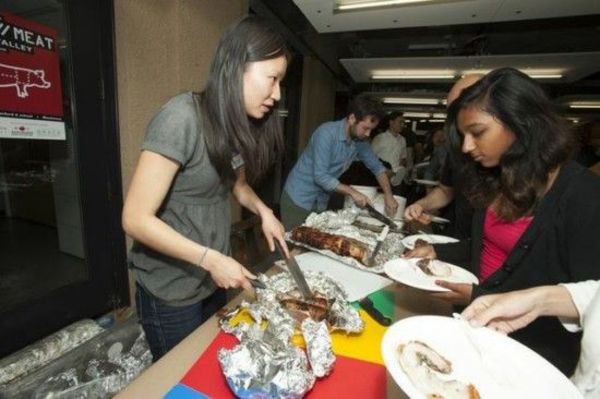Sustainable Meat Production and Technology Join Forces at Hack//Meat Conference

What happens when ranchers and tech geeks converge? To find out, we spoke to Danielle Gould, founder of Food + Tech Connect, and the brains behind the second annual Hack//Meat Silicon Valley conference. Read on for a look into the future of sustainable meat production and other agricultural innovations.
Silicon Valley may not seem a likely place for farmers, ranchers, and chefs to gather, but that’s exactly what happened between June 21 and 23 at Food + Tech Connect’s second annual Hack//Meat Silicon Valley “hackathon,” held at the Institute of Design at Stanford.
For 48 hours, food industry leaders, technologists, and entrepreneurs worked to “develop hardware and software solutions to some of the greatest challenges facing sustainable meat production and consumption.” Twenty-four teams tackled industry issues including farmland access, whole animal utilization, and food labeling, before pitching their prototypes to an esteemed panel of judges (bigwigs from the restaurant, sustainable meat, and tech industries). Winners received prizes that will help them further develop their prototypes.
A butchery demo ofgrass-fed beef by San Francisco chefs Ryan Farr and Kent Schoberle of 4505 Meats provided deeper insight into the intimate relationship chefs increasingly have with raw ingredients. Sustenance for the weekend also featured a nose-to-tail dinner, and other locally- and sustainably-sourced meat and produce prepared by Google’s Food Team.

Read on for a conversation between OA and Danielle Gould, founder of Food + Tech Connect, and Hack//Meat:
Organic Authority: How do you see reconciling the tech industry with sustainable agriculture? They seem very polarized; many small ranchers and farmers of a certain generation don’t even have email.
Daneille Gould: Farmers farm — that is, they’re typically out in the field, managing livestock, planting crops, harvesting produce. Their primary job responsibilities don’t involve sitting in front of a computer. Nevertheless, that doesn’t mean they want to be disconnected from technological advances that can help them scale their businesses and limit inefficiencies in their supply chain. The trick is to develop technologies that are simple to use and can integrate seamlessly into their workflow.
One of the key challenges within our food system is the rapidly aging farmer population. If we can’t get more young people into farming, in a couple of decades there won’t be enough people growing our food. So, one of our challenges at Hack//Meat involved encouraging and helping young people–many of whom are much more tech-savvy than their older counterparts–gain access to farmland.
Hackers created easy-to-use online tools to address this challenge, like Grand Prize winner FarmStacker, an eHarmony or AirBnb-like tool that connects young farmers to land and capital. Another development was Cow Pool, an online purchasing platform that streamlines the supply chain from rancher to processor to consumer. Stewardship Agent is a database similar to MLS that allows young new ranchers to gain access to underutilized private lands, through a real-estate-type agent.

OA: In general, we live in a tech-addicted society, which in many ways is the opposite of what this conference is trying to achieve. Do you see us moving toward an integration of these two extremes? Is it even possible?
DG: The Bay area is a hotbed of both technological innovation, as well as sustainable food activism. What we saw firsthand at Hack//Meat Silicon Valley is that developers are defying the stereotype of pizza- and cereal-eating insomniacs: they actually really care about food. Our goal with Hack//Meat wasn’t necessarily to get techies to grow their own food (although that would be great), but to facilitate interaction and communal ideation between farmers and tech geeks.
We saw this on happening before our eyes on the opening night of Hack//Meat: A cowboy hat-wearing rancher was engaged in conversation with a young Silicon Valley developer; an agricultural activist swapped tales with a UX designer. We believe that these cross-industry interactions can be the catalyst to a much-needed, far-reaching disruption of the way meat is produced, processed, and consumed in this country. We’re hopeful that the prototypes generated and the ideas shared at Hack//Meat Silicon Valley are just the beginning of this cultural shift.

OA: For those of us who haven’t fully embraced the digital revolution for various reasons, is technological integration still relevant in order to eat better/more mindfully?
DG: The food industry is primed for technological disruption, yet challenges specific to food–like perishability, steep user adoption curves, and fragmentation–must be tackled, first. Only then can game-changing innovations offer the kinds of benefits for sustainable food that it has for other industries. Starting with meat, we’ve used the hackathon model to bring some of Silicon Valley’s brightest minds together to foster innovation in sustainability and health within the food industry.
All images: Mona T. Brooks

